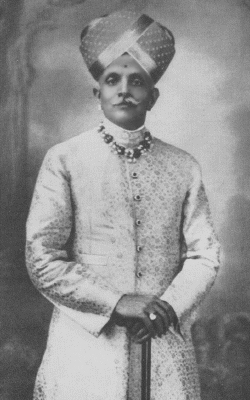At the Inauguration of the Reformed Legislative Council and the Representative Assembly on the 17th March 1924 Modern_Mysore, Dr. B. R. Ambedkar Open University, 26 November 2013, archive.org, 330-32 http://archive.org/stream/modernmysore035292mbp/modernmysore035292mbp_djvu.txt,
As ruler of the state
Krishna Raja Wadiyar IV: Zitate auf Englisch
Spoke on the occasion of the Economic Conference held during Dussera festival 1911 which brought wide awareness of the people on the effectiveness of Cooperative Societies. Modern_Mysore, Dr. B. R. Ambedkar Open University, 26 November 2013, archive.org, 206-07 http://archive.org/stream/modernmysore035292mbp/modernmysore035292mbp_djvu.txt,
As ruler of the state
Lord Irwin on the occasion of the State Banquet held on the 29th July on his taking over as Viceroy. Modern_Mysore, Dr. B. R. Ambedkar Open University, 26 November 2013, archive.org, 345-46 http://archive.org/stream/modernmysore035292mbp/modernmysore035292mbp_djvu.txt,
As ruler of the state
In his speech on being installed as the Maharaja of Mysroe at the age of 18Quoted in [Vikram Sampath, SPLENDOURS OF ROYAL MYSORE (PB), http://books.google.com/books?id=3aFmtr4MdLQC&pg=PT492, Rupa & Company, 978-81-291-1535-5, 492–]
Said at the banquet in honour of the Prince and Princess of Wales on the 30th January 1906. Modern_Mysore, Dr. B. R. Ambedkar Open University, 26 November 2013, archive.org, 206-07 http://archive.org/stream/modernmysore035292mbp/modernmysore035292mbp_djvu.txt,
As ruler of the state
In his address to the public on the occasion of his Silver Jubilee of his reign. Modern_Mysore, Dr. B. R. Ambedkar Open University, 26 November 2013, archive.org, 347-49 http://archive.org/stream/modernmysore035292mbp/modernmysore035292mbp_djvu.txt,
As ruler of the state
On the occasion of the opening of Industrial and Arts Exhibition on 26 December 1903 in Madras (now known as Chennai) Modern_Mysore, Dr. B. R. Ambedkar Open University, 26 November 2013, archive.org, 203 http://archive.org/stream/modernmysore035292mbp/modernmysore035292mbp_djvu.txt,
As ruler of the state
From Modern Mysore
From Modern Mysore
Said by the Dewan. Modern_Mysore, Dr. B. R. Ambedkar Open University, 26 November 2013, archive.org, 201 http://archive.org/stream/modernmysore035292mbp/modernmysore035292mbp_djvu.txt,
From Modern Mysore
Sir Evan Machonochie in his book “Life in the Indian Civil Service. Modern_Mysore, Dr. B. R. Ambedkar Open University, 26 November 2013, archive.org, 198 http://archive.org/stream/modernmysore035292mbp/modernmysore035292mbp_djvu.txt,
From Modern Mysore
Viceroy Lord Curzon in his investiture speech installing him as the Maharaja of Mysore stated in a Durbar held on 8 August 1902. Modern_Mysore, Dr. B. R. Ambedkar Open University, 26 November 2013, archive.org, 187 http://archive.org/stream/modernmysore035292mbp/modernmysore035292mbp_djvu.txt,
From Modern Mysore
Quoted here[Parsons, Constance E., Mysore City, http://books.google.com/books?id=am0dAAAAMAAJ, 1930, H. Milford, Oxford University Press]
